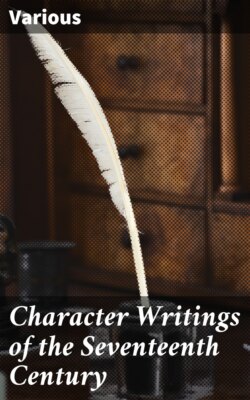Читать книгу Character Writings of the Seventeenth Century - Various - Страница 45
На сайте Литреса книга снята с продажи.
A MERE SCHOLAR.
ОглавлениеTable of Contents
A mere scholar is an intelligible ass, or a silly fellow in black that speaks sentences more familiarly than sense. The antiquity of his University is his creed, and the excellency of his college (though but for a match at football) an article of his faith. He speaks Latin better than his mother-tongue, and is a stranger in no part of the world but his own country. He does usually tell great stories of himself to small purpose, for they are commonly ridiculous, be they true or false. His ambition is that he either is or shall be a graduate; but if ever he get a fellowship, he has then no fellow. In spite of all logic he dares swear and maintain it, that a cuckold and a town's-man are termini convertibles, though his mother's husband be an alderman. He was never begotten (as it seems) without much wrangling, for his whole life is spent in pro et contra. His tongue goes always before his wit, like gentleman-usher, but somewhat faster. That he be a complete gallant in all points, cap-à-pie, witness his horsemanship and the wearing of his weapons. He is commonly long-winded, able to speak more with ease than any man can endure to hear with patience. University jests are his universal discourse, and his news the demeanour of the proctors. His phrase, the apparel of his mind, is made of divers shreds, like a cushion, and when it goes plainest it hath a rash outside and fustian linings. The current of his speech is closed with an ergo; and, whatever be the question, the truth is on his side. It is a wrong to his reputation to be ignorant of anything; and yet he knows not that he knows nothing. He gives directions for husbandry, from Virgil's "Georgics;" for cattle, from his "Bucolics;" for warlike stratagems, from his "Æneids" or Caesar's "Commentaries." He orders all things and thrives in none; skilful in all trades and thrives in none. He is led more by his ears than his understanding, taking the sound of words for their true sense, and does therefore confidently believe that Erra Pater was the father of heretics, Radulphus Agricola a substantial farmer, and will not stick to aver that Systemo's Logic doth excel Keckerman's. His ill-luck is not so much in being a fool, as in being put to such pains to express it to the world, for what in others is natural, in him (with much ado) is artificial. His poverty is his happiness, for it makes some men believe that he is none of fortune's favourites. That learning which he hath was in non age put in backward like a glyster, and it's now like ware mislaid in a pedlar's pack; a has it, but knows not where it is. In a word, his is the index of a man and the title-page of a scholar, or a puritan in morality--much in profession, nothing in practice.
